Cygnus is the Latin word for swan and may refer to:
Cygnus is the Latin word for swan and may refer to:

Cygnus is a northern constellation on the plane of the Milky Way, deriving its name from the Latinized Greek word for swan. Cygnus is one of the most recognizable constellations of the northern summer and autumn, and it features a prominent asterism known as the Northern Cross. Cygnus was among the 48 constellations listed by the 2nd century astronomer Ptolemy, and it remains one of the 88 modern constellations.
Orion may refer to:
Phoenix most often refers to:

The Progress is a Russian expendable cargo spacecraft. Its purpose is to deliver the supplies needed to sustain a human presence in orbit. While it does not carry a crew, it can be boarded by astronauts when docked to a space station, hence it is classified as crewed by its manufacturer. Progress is derived from the crewed Soyuz spacecraft and launches on the same launch vehicle, a Soyuz rocket.
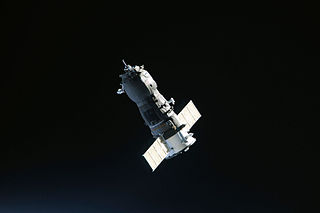
Uncrewed spacecraft or robotic spacecraft are spacecraft without people on board. Uncrewed spacecraft may have varying levels of autonomy from human input, such as remote control, or remote guidance. They may also be autonomous, in which they have a pre-programmed list of operations that will be executed unless otherwise instructed. A robotic spacecraft for scientific measurements is often called a space probe or space observatory.

The Automated Transfer Vehicle, originally Ariane Transfer Vehicle or ATV, was an expendable cargo spacecraft developed by the European Space Agency (ESA), used for space cargo transport in 2008–2015. The ATV design was launched to orbit five times, exclusively by the Ariane 5 heavy-lift launch vehicle. It effectively was a larger European counterpart to the Russian Progress cargo spacecraft for carrying upmass to a single destination—the International Space Station (ISS)—but with three times the capacity.
Orbital Sciences Corporation was an American company specializing in the design, manufacture, and launch of small- and medium- class space and launch vehicle systems for commercial, military and other government customers. In 2014, Orbital merged with Alliant Techsystems (ATK) to create a new company called Orbital ATK, which in turn was purchased by Northrop Grumman in 2018.
Hydra generally refers to:
A swan is a bird of the genus Cygnus or Coscoroba.

Cygnus is an expendable American automated cargo spacecraft designed for International Space Station (ISS) resupply missions. It was initially developed by Orbital Sciences Corporation with financial support from NASA under the Commercial Orbital Transportation Services (COTS) program. To create Cygnus, Orbital paired a pressurized cargo module, largely based on the Multi-Purpose Logistics Module, built by Thales Alenia Space and previously used by the Space Shuttle for ISS resupply, with a service module based on Orbital's GEOStar, a satellite bus. After a successful demonstration flight in 2013, Orbital was chosen to receive a Commercial Resupply Services (CRS) contract. A larger Enhanced Cygnus was introduced in 2015. Orbital Sciences merged into Orbital ATK in 2015; Northrop Grumman purchased Orbital ATK in 2018 and has continued to operate Cygnus missions. A further enlarged Mission B Cygnus is expected to be introduced in 2025.
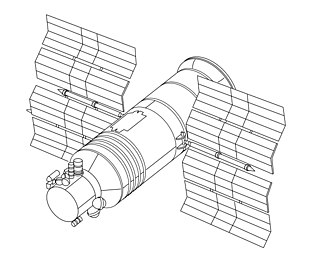
Gamma was a Soviet gamma ray telescope. It was launched on 11 July 1990 into an orbit around Earth with a height of 375 km and an inclination of 51.6 degrees. It lasted for around 2 years. On board the mission were three telescopes, all of which could be pointed at the same source. The project was a joint Soviet-French project.

Commercial Resupply Services (CRS) are a series of flights awarded by NASA for the delivery of cargo and supplies to the International Space Station (ISS) on commercially operated spacecraft.

A space tug is a type of spacecraft used to transfer spaceborne cargo from one orbit to another orbit with different energy characteristics. The term can include expendable upper stages or spacecraft that are not necessarily a part of their launch vehicle. However, it can also refer to a spacecraft that transports payload already in space to another location in outer space, such as in the Space Transportation System concept. An example would be moving a spacecraft from a low Earth orbit (LEO) to a higher-energy orbit like a geostationary transfer orbit, a lunar transfer, or an escape trajectory.

Planet Labs PBC is a publicly trading American Earth imaging company based in San Francisco, California. Their goal is to image the entirety of the Earth daily to monitor changes and pinpoint trends.

OA-6, previously known as Orbital-6, is the sixth flight of the Orbital ATK uncrewed resupply spacecraft Cygnus and its fifth flight to the International Space Station under the Commercial Resupply Services (CRS) contract with NASA. The mission launched on 23 March 2016 at 03:05:52 UTC.
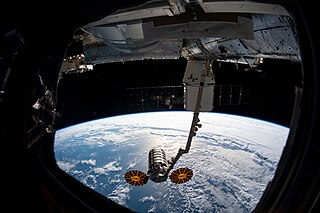
NG-11, previously known as OA-11, is the twelfth flight of the Northrop Grumman robotic resupply spacecraft Cygnus and its eleventh flight to the International Space Station under the Commercial Resupply Services (CRS-1) contract with NASA. The mission launched on 17 April 2019 at 20:46:07 UTC. This is the last mission from the extended CRS-1 contract; follow-up missions are part of the CRS-2 contract. Cygnus NG-11 was also the first mission to load critical hardware onto Cygnus within the last 24 hours prior to launch, a new Antares feature.

NG-13, previously known as OA-13, was the fourteenth flight of the Northrop Grumman robotic resupply spacecraft Cygnus and its thirteenth flight to the International Space Station (ISS) under the Commercial Resupply Services (CRS-1) contract with NASA. The mission launched on 15 February 2020 at 20:21:01 UTC after nearly a week of delays. This is the second launch of Cygnus under the CRS-2 contract.
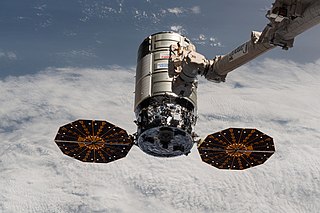
NG-14, previously known as OA-14, was the fifteenth flight of the Northrop Grumman robotic resupply spacecraft Cygnus and its fourteenth flight to the International Space Station under the Commercial Resupply Services (CRS-1) contract with NASA. The mission was launched on 3 October 2020, at 01:16:14 UTC.

Cygnus NG-15, previously known as OA-15, was the fifteenth launch of the Northrop Grumman robotic resupply spacecraft Cygnus and its fourteenth flight to the International Space Station (ISS) under the Commercial Resupply Services (CRS) contract with NASA. The mission launched on 20 February 2021 at 17:36:50 UTC. This is the fourth launch of Cygnus under the CRS-2 contract.
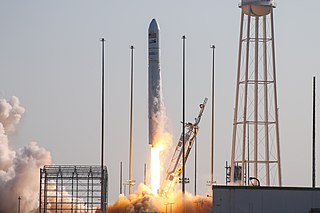
NG-16, previously known as OA-16, was the sixteenth flight of the Northrop Grumman robotic resupply spacecraft Cygnus and its fifteenth flight to the International Space Station (ISS) under the Commercial Resupply Services (CRS-2) contract with NASA. The mission was launched on 10 August 2021 at 22:01:05 UTC, for a (planned) 90-day mission at the ISS. This was the fifth launch of Cygnus under the CRS-2 contract.